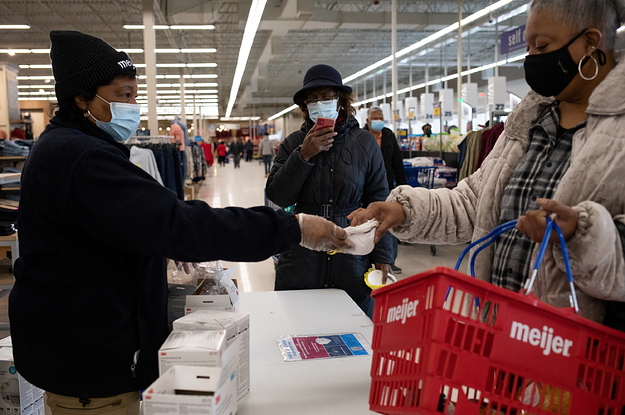
When should you wear an N95 mask?
If you find yourself periodically removing an N95 because it’s uncomfortable to wear, it’s not your best option. Experts suggest you try out different N95 mask shapes until one suits you.
Here’s when the CDC says you should really try to wear an N95 or other type of mask that offers high protection:
- You are caring for someone with COVID
- You are at increased risk because you are immunocompromised or have an underlying condition
- If you have a job, such as a bus driver or a grocery store worker, where you interact with a lot of people
- You are traveling on planes or other forms of public transportation where you might be crowded in with other people for long periods of time
- You are at crowded indoor or outdoor places where you can’t social distance
- You don’t have all of your recommended COVID vaccinations
Who should avoid wearing N95 masks?
If you have chronic respiratory, heart, or other medical conditions that make it hard to breathe, you should talk with your doctor before adding N95 masks to your COVID repertoire, the US Food and Drug Administration and other experts say.
Have facial hair? You may need to shave it or wear a “mask fitter or brace” the CDC says, because tiny gaps in your beard may allow unfiltered air to seep in and out.
Banach of UConn Health admits people with claustrophobia may also struggle wearing N95s.
Can children wear N95s?
N95 respirators are tested and designed for adults, so they may not offer the best fit for kids. The government is also shipping only adult-sized masks, the HHS spokesperson told BuzzFeed News.
There are no NIOSH-approved N95 masks for kids, a CDC spokesperson confirmed, but some companies may make them, or others like KN95s, in smaller sizes.
At the minimum, Karan said, kids, particularly those with weakened immune systems, should wear well-fitted surgical masks, which are more comfortable and offer better protection than cloth masks. (Again, children under age 2 shouldn’t wear masks at all.)
The priority is to find a comfortable one that kids won’t tear off in seconds.
“Making sure it's snug and comfortable are the most important things with kids,” Banach said, “often even more so than the actual thickness and filtration of the mask.”
How to wear an N95 properly
Before putting your N95 mask on, you should check for markings that indicate the mask is authentic and look for any damages.
If all is good, cup the mask in your hand and hold it over your mouth and nose. Slide one strap over to the back of your head and place the other across your neck below your ears.
Make sure you put both straps to work, Banach said, otherwise you risk a loose fit and reduced protection, like wearing shoes without tied laces.
Next, press the wire above your nose to mold it to your face. You can perform a “seal check” by putting both hands on your mask and blowing out. Felt an air leak? Readjust your straps and nose wire.
If you find N95 masks too uncomfortable to wear for long periods of time, limit your use to situations that are high risk, such as crowded indoor spaces, Karan suggests.
“That's where you'll get the most bang for your buck,” he said.
Can you reuse N95s? How to know it’s time to trash your mask
Short answer: they aren’t designed to function beyond a single use, but it’s probably fine to reuse them, experts say. You can only receive three free N95s, and your exposure to the COVID-causing virus is generally not as intense as you go about your daily life compared with healthcare settings where masks are tossed after one use.
Karan recommends using a different N95 mask per day of the week, if you can; so you’ll have a Monday mask, Tuesday mask, and so on. That way you can let the mask air out for a week in between uses.
In fact, the more you wear your N95 respirator, the more effective it becomes, Karan said, because the filter gets clogged with particles that block others from coming in. However, breathability will decrease over time.
If you want to extend your N95’s shelf life, especially if you have only a couple on hand, you can wear a surgical mask over it when in high-risk settings or scenarios, Banach said.
Generally, double-masking is not recommended or needed with N95s.
When your mask is visibly dirty, gets damaged or fits loosely, or your straps become too stretched, then it's time to trash it, experts say.
The initial shipment of 400 million N95s will eventually run out, but the HHS spokesperson told BuzzFeed News it’s responding in “real-time” to demand and will replenish the stockpile as needed.
Can you disinfect or clean N95s?
There’s really no need to, Karan said, emphasizing the coronavirus is an airborne pathogen. “It’s not going to go from your mask to your hand and infect you.”
You’ll also risk damaging your mask, rendering it ineffective.
“For now, recycle your mask over a few weeks, get through this surge, and then I hope the US government will increase the supply to get people more masks and accessible options,” Karan said.
Do N95 masks expire?
N95 respirators do expire, Banach said, but it’s usually several years after they are made.
As long as you store your N95s according to its box instructions, you’ll be fine — unless you’re saving them for the next inevitable pandemic.
Business - Latest - Google News
January 28, 2022 at 09:01PM
https://ift.tt/3o77bZj
11 Things To Know About Where To Get Free N95 Masks And How To Use Them - BuzzFeed News
Business - Latest - Google News
https://ift.tt/2Rx7A4Y
Bagikan Berita Ini














0 Response to "11 Things To Know About Where To Get Free N95 Masks And How To Use Them - BuzzFeed News"
Post a Comment